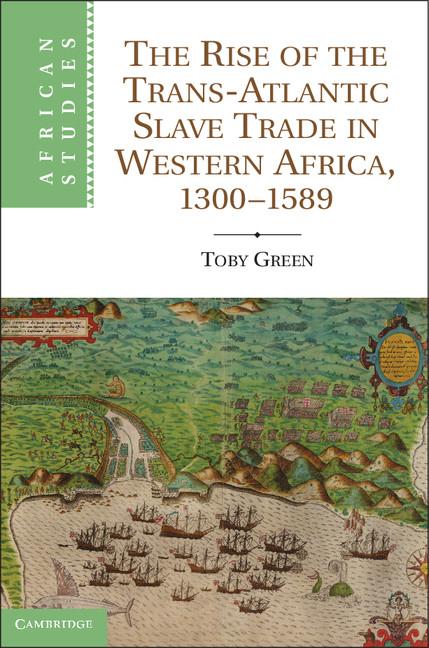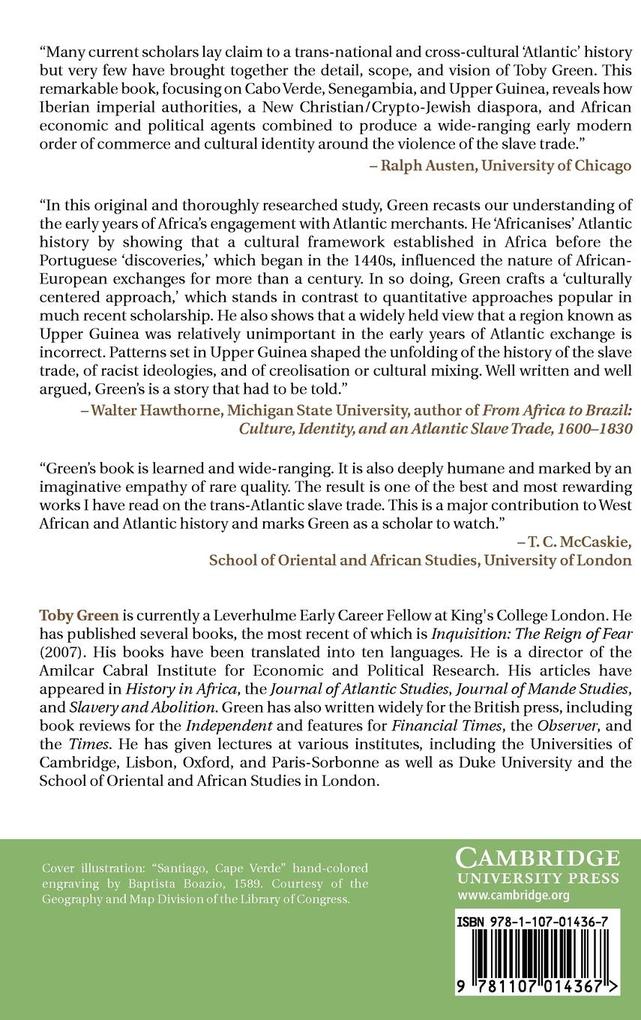
Zustellung: Fr, 30.05. - Di, 03.06.
Versand in 1-2 Wochen
VersandkostenfreiBestellen & in Filiale abholen:
Toby Green describes the rise of the trans-Atlantic slave trade in the aftermath of the Spanish conquest.
Inhaltsverzeichnis
Part I. The Development of an Atlantic Creole Culture in Western Africa, c. 1300-1500: 1. Culture, trade, and diaspora in pre-Atlantic West Africa; 2. The formation of early Atlantic societies in Senegambia and Upper Guinea; 3. The settlement of Cabo Verde and early signs of Creolization in Western Africa; 4. The new Christian diaspora in Cabo Verde and the rise of a Creole culture in Western Africa; 5. The new Christian/Kassanké alliance and the consolidation of Creolization; Part II. Creolization and Slavery: Western Africa and the Pan-Atlantic, c. 1492-1589: 6. The early trans-Atlantic slave trade from Western Africa; 7. Trading ideas and trading people: the boom in the contraband trade from Western Africa, c. 1550-80; 8. Cycles of war and trade in the African Atlantic, c. 1550-80; 9. Creole societies and the pan-Atlantic in late sixteenth-century Western Africa and America; Part III. Conclusion: 10. Lineages, societies, and the slave trade in Western Africa to 1589.
Produktdetails
Erscheinungsdatum
01. Oktober 2011
Sprache
englisch
Seitenanzahl
366
Autor/Autorin
Toby Green
Verlag/Hersteller
Produktart
gebunden
Gewicht
744 g
Größe (L/B/H)
235/157/26 mm
ISBN
9781107014367
Entdecken Sie mehr
Pressestimmen
'Many current scholars lay claim to a transnational and cross-cultural 'Atlantic' history but very few have brought together the detail, scope, and vision of Toby Green. This remarkable book, focusing on Cabo Verde, Senegambia, and Upper Guinea, reveals how Iberian imperial authorities, a New Christian/Crypto-Jewish diaspora, and African economic and political agents combined to produce a wide-ranging early modern order of commerce and cultural identity around the violence of the slave trade.' Ralph Austen, University of Chicago '... original and thoroughly researched ... Green recasts our understanding of the early years of Africa's engagement with Atlantic merchants. He 'Africanizes' Atlantic history by showing that a cultural framework established in Africa before the Portuguese 'discoveries' ... influenced the nature of African-European exchanges for more than a century ... Green crafts a 'culturally centered approach', which stands in contrast to quantitative approaches popular in much recent scholarship. He also shows that a widely held view that a region known as Upper Guinea was relatively unimportant in the early years of Atlantic exchange is incorrect ... Well written and well argued, Green's is a story that had to be told.' Walter Hawthorne, Michigan State University, and author of From Africa to Brazil: Culture, Identity, and an Atlantic Slave Trade, 1600-1830 'Green's book is learned and wide-ranging. It is also deeply humane and marked by an imaginative empathy of rare quality. The result is one of the best and most rewarding works I have read on the trans-Atlantic slave trade. This is a major contribution to West African and Atlantic history and marks Green as a scholar to watch.' T. C. McCaskie, School of Oriental and African Studies, University of London 'This book offers a real window [into] the history of the diversity of West African societies before the seventeenth century. The protagonists are slaves, women, Jews, Mestizos, Capeverdeans and African merchants - all of whom contributed to new identities. The space of reflection opened by T. Green is rich in ways of thinking about the formation of West African societies, the first Atlantic exchanges and the configuration of new identities in American space.' Antonio de Almeida Mendes, translated from Annales: Histoire, Sciences Sociales
Bewertungen
0 Bewertungen
Es wurden noch keine Bewertungen abgegeben. Schreiben Sie die erste Bewertung zu "The Rise of the Trans-Atlantic Slave Trade in Western Africa, 1300 1589" und helfen Sie damit anderen bei der Kaufentscheidung.











